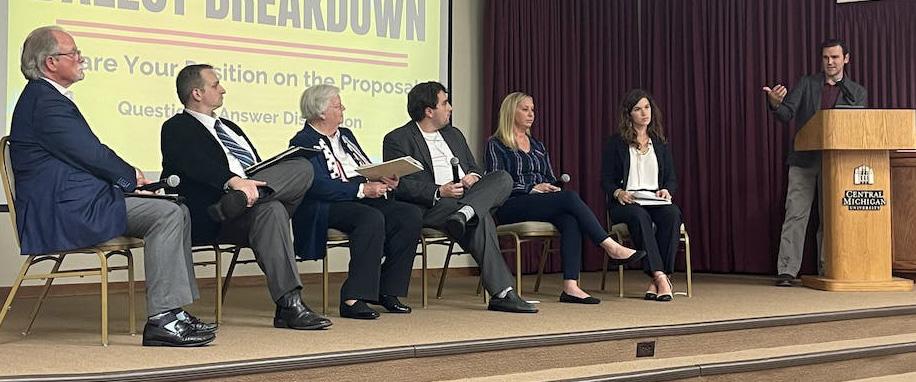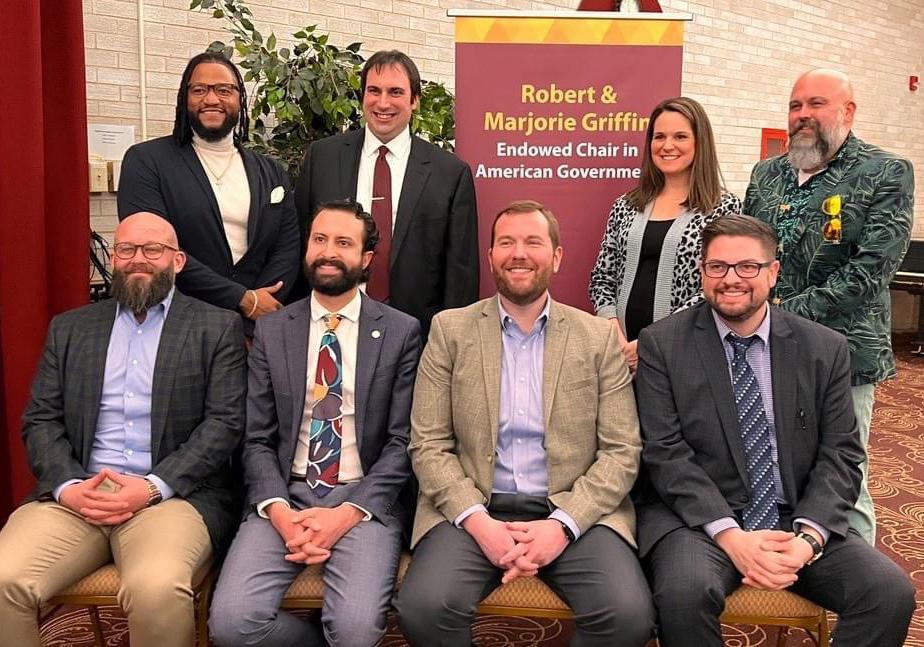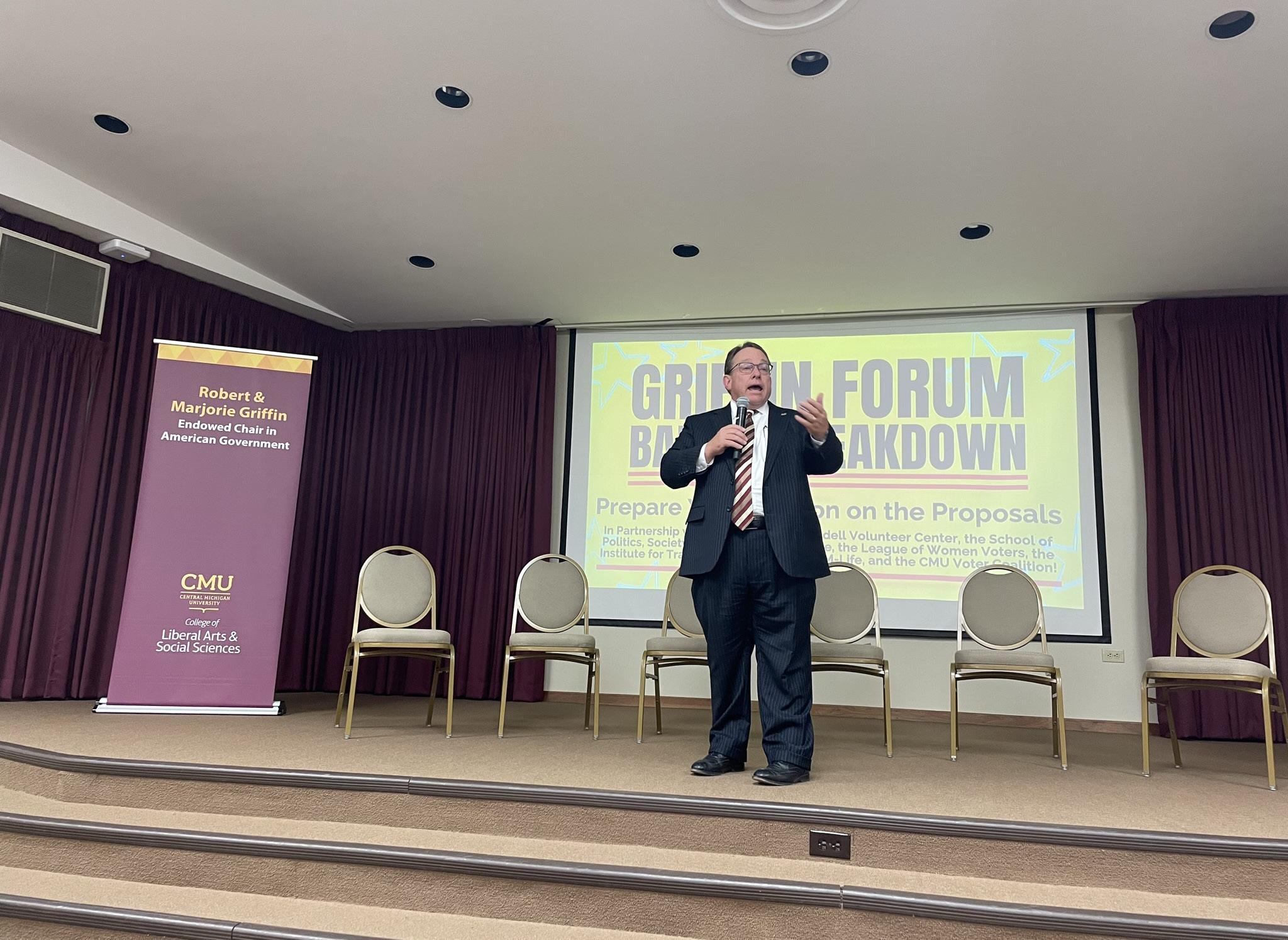
4 minute read
2022 Griffin Forum Recap
2022 GRIFFIN FORUMS RECAP
The Griffin Endowed Chair in American Government organizes multiple policy forums that highlight social, political-economic, environmental, and other relevant and important issues. The forums are hosted twice yearly by the Robert and Marjorie Griffin Endowed Chair in American Government in the School of Politics, Society, Justice and Public Service at Central Michigan University.
Advertisement
Griffin Forum: Spring 2022 Cannabis Policy: Hashing it Out
Panelists for the Spring 2022 Griffin Policy Forum on March 15th discussed the history and background of cannabis nationally and in Michigan, the licensing market, operators’ perspectives, and the path forward. The panel was moderated by Chad Livengood, Senior Editor, Politics and Policy, Crain’s Detroit and panelists were Andrew Brisbo, Executive Director, Michigan’s Marijuana Regulatory Agency, Jerome Crawford, Director of Legal Operations & Social Equity, Pleasantrees, John Fraser, Michigan Team Leader of Dykema’s Cannabis Practice, Yousef Rabhi, State Representative, 53rd House District, and Benjamin Sobczak, Chief Legal Officer, Pleasantrees. After initial opening remarks from interim-Provost Dr. Richard Rothaus, Professor Andrea LaFontaine, and Dr. Nikita Murry, the forum began with a historical overview of humans and cannabis from Fraser of Dykema. John Fraser emphasized the stigmatism of cannabis to racist policies and nonsensical decision making which defies reason in the face of the plant’s historical use by humanity. Andrew Brisbo discussed the density of medical marijuana facilities in the Detroit area after the 2008 ballot initiative with over 200+ stores in the city alone. He emphasized the ballot initiative process in Michigan as the way to move the cannabis issue forward. Jerome Crawford talked about the marijuana industry from a business and social equity perspective which recognized the historical precedent of criminalized marijuana that put many people behind bars. Benjamin Sobczak spoke of the legal barriers that face marijuana businesses in Michigan including it being a cash-only business, inability to access lines of credit from large banks, and the 280E part of Representative Yousef Rabhi like Brisbo, focused on the ballot initiative process in Michigan for having moved the cannabis issue forward. Rabhi said that the state legislature is willing to continue to engage with the issue because voters have made it permissible to do so through their legalization efforts. According to Rabhi, it will allow individuals with offenses scrubbed to better secure employment, gain loans for their homes, and be able to live more unhindered lives. Once the panelists each had their initial remarks, the panel then moved to a question-answer session where existing rules and regulations, social justice, and awareness issues concerns were addressed by the panelists.


President Davies speaking at the Fall 2022 Forum
Griffin Forum Fall policy discussion conducted on October 25, featuring campaign representatives for Proposals 1, 2, and 3. This forum is hosted in partnership with the Mary Ellen Brandell Volunteer Center, the League of Women Voters, the Institute for Transformative Dialogue, CM Life, and the CMU Voter Coalition. In the support of Proposal 1, ‘Voters for Transparency & Term Limits’, was Rich Studley, former president and CEO of the Michigan Chamber of Commerce and current chairman of the Central Michigan University Board of Trustees, and opposition ‘No More Time for Career Politicians’, was represented by Scott Tillman, the grassroots activist. In support of Proposal 2, ‘Promote the Vote’, was Susan Smith, and in opposition, ‘Secure MI Vote’, was Jeff Litten. Dr. Melissa Bayne, DO was representing Proposal 3 Support, ‘MI Reproductive Freedom’, and Abby Wirth was in opposition to proposal 3, ‘Support Women & Children,’ and the forum was moderated by Professor Dr. Andrew Bloom. Opening remarks were given by CMU President Dr. Bob Davies, Griffin Chair Andrea LaFontaine, and Assistant Director for Volunteer Center, Symantha Dattilo. Supporting proposal 1, Rich Studley said, “I don’t deliberately seek out people with less than six years experience,” using experienced individuals in other fields as an example of competency in political roles. Opposing that, Scott Tillman argued that “legislators in states with tighter term limits tend to write tighter legislation that can’t be abused later on.” He further added, “lobbyists hate term limits because it breaks up the relationships and makes their jobs difficult.” In favor of Proposal 2, Susan Smith, the vice president of the League of Women Voters in Michigan, said, “this proposal will ensure that every voice is heard and every vote is counted in every election, no matter what political candidate or party or where we live.” In opposition, Jeff Litten, the executive director of Secure MI Vote, said they see this proposal as an opening for more questioning of election security. He said he opposes the use of affidavits instead of voter identification at voting sites because they lack a verification process. Favoring Proposal 3, Melissa Bayne, a physician specializing in obstetrics and gynecology affirmed that she is voting yes. She stated that she has read the entire proposal and does agree with all of it. Abby Jones, a recent CMU graduate, and political activist argued that Proposal 3 is confusing, extreme, and permanent. She said that the language of the proposal, saying the reference to an “individual” having access to abortion procedures means children can receive an abortion without parental consent. After the panelists expressed their supporting and opposing arguments for all three proposals the forum went to a questionanswer session, where participants raised their concerns about the proposals. The forum ended with concluding remarks of professor Dr. Norma Bailey.





